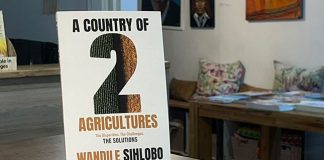In late February, Parliament voted in favour of the Restitution of Land Rights Amendment Bill. This legislation will open a new five-year window for land claims. Government expects about 400 000 such claims at a cost of about R200 billion. The law will give rise to four immediate problems that may lead to the effective nationalisation of agriculture in South Africa.
The first is that less than 10% of the funds necessary to buy claimed farms has been budgeted for in the next five years. Simply put, there will not be enough money to buy these farms. The second is that the number of claims will overwhelm the courts and the justice system. This means that it will not be easy, or even possible, to test the legitimacy of a specific claim in court.
The result is that many fraudulent and illegitimate claims will be lodged as claimants take chances in an attempt to get a farm. The third is the likelihood that several claims will be lodged for the same farms. Hence we will see competing claimants in conflict with each other for the same piece of land.
The fourth is that government and the ANC are likely to encourage claims. Both government and the party are under mounting economic pressure. Opinion polls have put confidence in government at its lowest in 20 years. As far back as 2009, more people chose not to vote than voted for the ANC.
At present, there are on average five violent anti-government protests every day. Therefore, the ANC will use the promise of free land to try to regain supporters’ confidence, but this attempt will backfire for reasons outlined later.
What will happen next?
Together, these four problems are likely to precipitate a crisis. The SA Institute of Race Relations expects that
government will then enter the fray to restore order. It will argue that the prolonged process of land reform is failing, that uncertainty threatens agricultural production and food security, and that popular expectations must be met to prevent unrest and violence. Its solution will be to seize all agricultural land as a ‘custodian’ of the land on behalf of ‘the people’.
This is possible under the new Promotion and Protection of Investment Bill, which argues that if the state takes property, not as owner, but as custodian, no expropriation takes place and therefore no compensation is payable. This distinction between custodianship and ownership is a crucial one.
The Constitutional Court has already set a precedent in the mining industry. Although the court’s decision was
flawed and may in time be replaced by a better ruling, for as long as the current precedent exists there is reason to question those who say the property clause in the Constitution prevents the seizure of land without compensation.
Such analysts do not understand how the law has been interpreted by the Constitutional Court and how that judgement – coupled with the wording of the Investment Bill – allows the state to circumvent the protection in the property clause of the Constitution. The move to re-open land claims may thus be little more than an attempt to nationalise land by stealth and has little to do with restoring ownership of land to black people. In fact, we doubt that many black people will ever receive a title deed to their claimed land.
Retrogressive
Government’s apparent intention to take possession of agricultural land in this way would be a very foolish move. If each new claimant, out of the projected 400 000, claims just 200ha, all agricultural land in the country could be under claim within five years. That would destroy the market for agricultural land and thus the value of
such land – leaving farmers without the collateral that many depend on to borrow the working capital needed to keep producing.
Investment in agriculture would decline sharply, as would agricultural production. Food prices – already under upward pressure from the weakening rand, higher fuel and electricity prices, and steeply climbing agricultural wages – would rise sharply. Higher food prices would in turn drive inflation higher, eroding the real living standards of all South Africans.
The poor and unemployed would be affected most, as they depend on welfare payments that would not be able to keep pace with rising inflation. The disadvantaged would become much poorer and increasingly angrier – and place government in an even greater predicament than it faces today. Rural areas would be
hardest hit. As farming business declined, so would upstream and downstream industries that depend on agriculture.
Jobs would vanish, along with much of the local profit and revenue that currently help to sustain small towns. This would all pile the pressure on government, which would have only one ‘solution’ – the promise of free land to placate increasingly restive rural communities. The biggest agricultural producers might be able to strike empowerment deals, or otherwise reach agreements with government that would allow them to continue operating.
But this option would not be open to the bulk of smaller farmers, who are the bedrock of the rural economy and are in any case likely to suffer great uncertainty and hardship in the years ahead.
Opposition
From what I have set out, it should be evident that the ANC – despite the lip service it pays to the more market-orientated National Development Plan – is beginning to take the more ‘radical’ steps mooted at both its Midrand and Mangaung conferences in 2012. This trend will continue in agriculture unless powerful campaigns and well-funded advocacy efforts are adopted to make the case for property rights and commercial
farming in South Africa.
An absolute necessity is to change the currentclimate of opinion. This is largely hostile to commercial agriculture and insists, despite evidence to the contrary, that smallholder farming can succeed, while it
ignores the fact that the key requirement is to sort out customary tenure in the former homelands. In this climate of opinion, it is difficult for agribusiness or farmer unions to negotiate successfully with government, as the latter is supported by the climate of opinion and sees little reason to abandon these more radical policies.
We believe that changing the climate of opinion is possible, but will require repeated emphasis on free-market ideas and principles that work, and the evidence of their success. In addition, it needs to be stressed that giving the state so much power over land and the rural economy is a folly, and there is evidence of how this has failed wherever it has been attempted. It is also important to point out how the current trajectory of policy will worsen – not relieve – the pressure on government.
If such a campaign meets with broad support from the commercial agricultural sector, and related industries, it may yet be possible to secure a more enabling agricultural policy environment and a future for commercial
farmers in South Africa.
Email Dr Frans Cronje on ceo.sairr.org.za.
The views expressed in our weekly opinion piece do not necessarily reflect those of Farmer’s Weekly.













